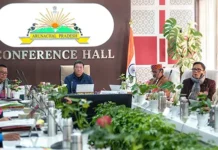[ Amar Sangno ]
ITANAGAR, 4 Aug: The State Pollution Control Board (SPCB) has imposed penalties on the Itanagar Municipal Corporation (IMC) and the Pasighat Municipal Council (PMC) for failing to comply with the National Green Tribunal’s (NGT) order issued on 28 February, 2020, regarding legacy waste remediation (LWR) and sewage treatment plant (STP).
The SPCB levied Rs 90 lakhs (Rs 75 lakhs for STP and Rs 15 lakhs for LWR) each on the IMC and the PMC through an order on 30 July as environmental compensation charge for failing to reduce the pollution load on the water bodies as per the NGT’s ruling.
The NGT’s principal bench in New Delhi on 28 February, 2020, heard the original application No 606/2018 in the matter of compliance with the Municipal Solid Waste Management Rules, 2016.
The NGT in its ruling observed that discharge of untreated sewage is statutorily prohibited under the provisions of the Water Act, 1974, as well as under the orders of the NGT.
“Untreated waste water and raw sewage being continuously discharged in water bodies needs to be stopped. As already observed, prompt action needs to be taken to reduce the pollution load on the recipient river systems by way of phytoremediation and bioremediation or any other alternative low capital-intensive natural remediation processes, and to successfully tap the sewage-containing storm water drains, so as to channelize the untreated sewage to the central STP,” the NGT added.
Quoting the NGT ruling, the SPCB observed that no STPs have been set up or commissioned by the urban local body (IMC) “in spite of the NGT’s laid down timeline to set up STPs by 31 March, 2020.”
The SPCB added that the IMC and the PMC have failed to adhere to the timelines set by the NGT for setting up and commissioning STPs, “and therefore, in exercise of the powers conferred under Section 33 A of the Water (Prevention and Control of Pollution) Act, 1974, environmental compensation charges amounting to Rs 75,00,000 each is hereby imposed against the IMC and the PMC for violation.”
It further directed that the environmental compensation charges be deposited in the form of bank drafts drawn in favour of the APSPCB member secretary within a period of one month from the date of issuing of the order.
“If the IMC/PMC is unable to bear the financial burden, the liability will be of the state government, with liberty to take remedial action against the erring local body,” the SPCB observed.
It further observed that, “as per the quarterly compliance report of the IMC and the PMC, the work on legacy waste remediation has not commenced and there is continued failure by the IMC and the PMC in commencing the work of legacy waste sites remediation from 1 April, 2020 onwards.”
The board levied environmental compensation charges amounting to Rs 15 lakhs each under Section 33 A of the Water (Prevention and Control of Pollution) Act, 1974, on the IMC and the PMC “for non-compliance with the NGT ruling over legacy waste remediation in their respective jurisdiction.”
“The duties and responsibilities of the implementing authorities are well-defined under the Solid Waste Management Rules, 2016,” SPCB Member Secretary Koj Rinya said.
However, the IMC authority stated that the responsibility of overseeing the road and drainage network in the Itanagar capital region is yet to be assigned to the IMC and is still being managed by the PWD.
“Regarding STP, we have projects – one in Naharlagun, which is 20 percent complete, and one in Itanagar, which is about 30 percent complete,” said IMC Commissioner Chukhu Cheechung.
“Now we have master plans of drainage systems for the ICR, in which all measures will be incorporated with the SWM plants in Chimpu and Karsingsa. For this reason, our mayor had a one-to-one discussion with the state government and the union UD minister. The order of the pollution control board will be made over to the state government for scrutiny and further order. The IMC is fully dependent on the state government,” Cheechung said.
On being contacted with regard to the PMC, East Siang Deputy Commissioner Dr Kinny Singh stated that the authority concerned is looking into the issue.
In August 2020, Itanagar, the capital of Arunachal, had ranked 7th among the 10 dirtiest cities of the country in the category of below 10 lakh population in the Swachh Survekshan 2020.




